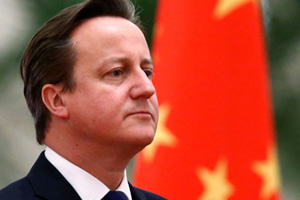Li puts China-UK ties on new level
 |
|
Zhou Xiaoming, minister counselor with the economic and commercial office at the Chinese embassy in London. [Photo by Cecily Liu] |
Chinese Premier Li Keqiang's visit to the United Kingdom last week has brought the UK and China's relations to a new level of cooperation, said Zhou Xiaoming, minister counselor with the economic and commercial office at the Chinese embassy in London.
Li visited the UK from June 16-19, with a delegation from China comprising of almost 200 representatives from 78 businesses. During this period, a total of 19 deals worth $32.5 billion were signed between British and Chinese businesses and organizations.
Zhou said Li's visit has not only led to a large number of business deals being signed; his discussions with the British Prime Minister David Cameron have also shaped the close relationship between the two countries and set the direction for future cooperation.
"In the past, Cameron has described the two countries' relationships as ‘partners for growth', but for the first time last week he has said it is one of ‘growth, reform and innovation'," Zhou said.
"The Chinese Premier has also proposed for the first time, that the two countries should push forward common growth and inclusive development," he said.
In Zhou's view, the two leaders' new understanding about the UK-China relationship has put great significance on the relationship.
The two leaders signed a joint statement, which included 30 items of cooperation, 12 of which refer to economic cooperation. The target of expanding China-Britain trade to $100 billion in 2015 is affirmed in the statement.
The statement also emphasized the importance of bilateral investment, and expressed support for Chinese companies to invest in the UK.
It also affirmed the two countries' desire to cooperate in a number of fields, including infrastructure, energy, transport, offshore wind, the internationalization of the yuan, the development of Shanghai Free Trade Zone, urbanization, healthcare, high-tech trade, aviation and maritime.
"The statement really shows commitment by the two governments to grow the business relationship, and demonstrate to businesses that no political barrier exists for their investments," Zhou said.
He said such political support is important particularly for industries like civil nuclear power, where the UK side affirmed that it is open to Chinese companies leading the development of nuclear power stations in the UK and the potential deployment of Chinese reactor technology in the UK.
"This is the first time the UK government has said they will welcome Chinese companies to lead on nuclear power stations in the UK. If this can be achieved, the UK will become a platform for Chinese nuclear companies to expand to other Western countries," said Zhou.
Other significant deals include oil major BP's agreement to provide China National Offshore Oil Corp with liquefied natural gas for 20 years, which is worth $18 billion. And Royal Dutch Shell signed a comprehensive cooperation agreement with Chinese energy giant China National Offshore Oil Corporation.
The State-owned China Development Bank signed an agreement, with TheCityUK, a private financial services association. It will encourage bank lending in the UK as well as trading in the yuan, which will open up trade opportunities for Chinese and UK businesses.
Meanwhile, China Construction Bank was appointed an official yuan clearing bank in London, a milestone in London's effort to grow an offshore yuan center. China's central Bank, the People's Bank of China, has also said that the yuan will be traded directly against sterling in the interbank foreign exchange market.
Zhou said all those deals demonstrate great synergy between China and the UK's economies, and he sees great potential to grow bilateral trade and investment links in the future.
Zhou said one key synergy that can be achieved between the two countries is to combine British innovation with China's market and productivity.
"Innovation is a key advantage of British companies and industries. Now increasingly Chinese companies are cooperating with innovative British companies to take production to China, where cost is cheaper and scale greater, and sell these products to the massive Chinese market," he said.
He said another key area for cooperation is for high tech and strategically important Chinese companies and industries to expand into the UK, like nuclear and high speed rail. These Chinese companies can then expand into other Western countries after proving themselves as having high quality products and technologies in the UK.
"The UK is very open to business, and will be a good partner for China as it internationalizes many of its industries," Zhou said.





